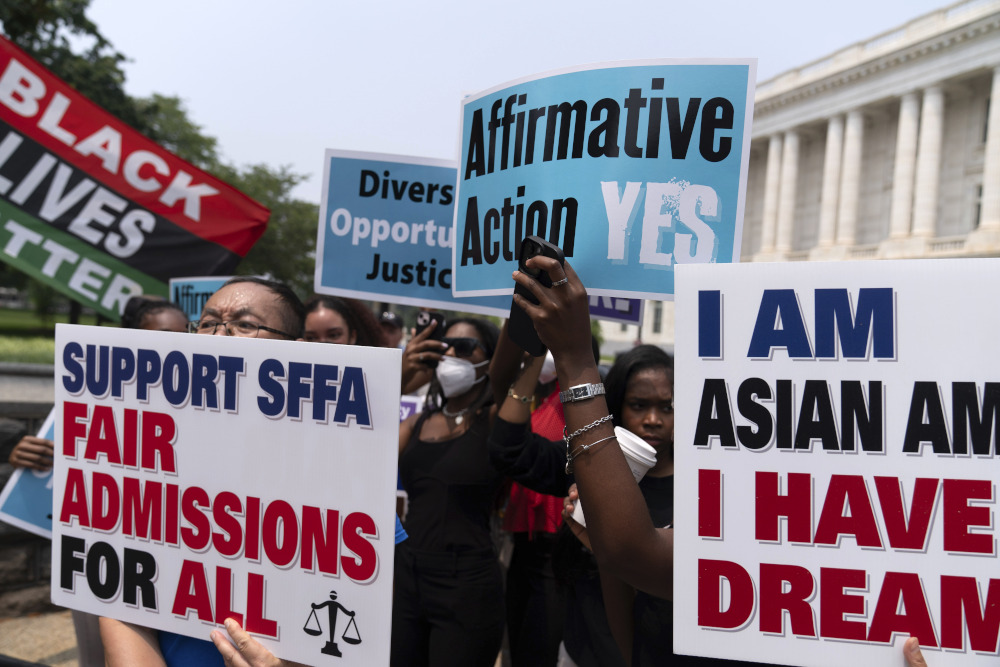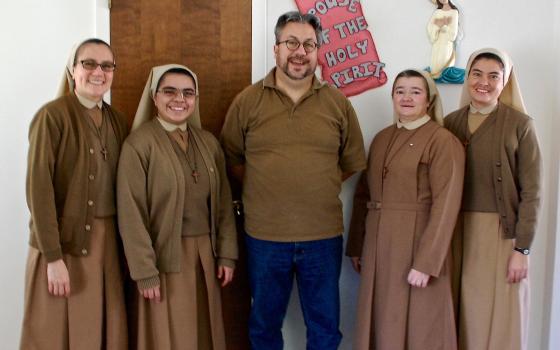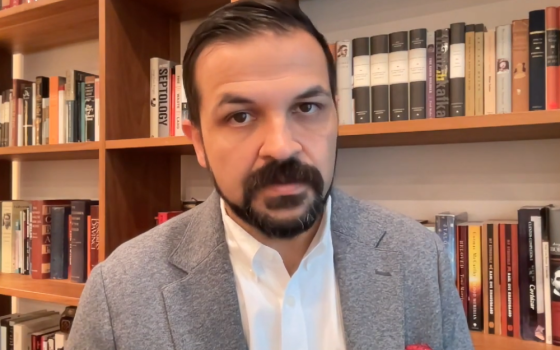
Demonstrators protest outside of the Supreme Court in Washington June 29, after the Supreme Court struck down affirmative action in college admissions, saying race cannot be a factor. (AP/Jose Luis Magana)
In a long-awaited decision on affirmative action, the U.S. Supreme Court ruled the practice unconstitutional in a groundbreaking 6-3 decision on June 29, falling along ideological lines with a conservative Catholic majority.
The ruling concerns two nearly 9-year-old cases filed against the University of North Carolina and Harvard University by Students for Fair Admissions (SFFA), a conservative activist firm teaming with anonymous Asian American and White students denied admission at the two schools. SFFA argued that the school's admission policies were unfairly discriminatory in their consideration of race as one of several factors in admitting students from underrepresented backgrounds.
Chief Justice John Roberts held, with Associated Justices Clarence Thomas, Samuel Alito, Neil Gorsuch, Brett Kavanaugh, and Amy Coney Barrett, that universities "have concluded, wrongly, that the touchstone of an individual's identity is not challenges bested, skills built, or lessons learned but the color of their skin."
"Our constitutional history does not tolerate that choice."
Advertisement
The landmark 237-page decision reverses the previous decisions of the court in Grutter v. Bollinger (2003) and Regents of the University of California v. Bakke (1978), which buttressed the mid-20th century affirmative action phenomenon in higher education, meant to combat racial disparities resulting from slavery and segregation. (Critics of the practice have noted that, since its widespread adoption, beneficiaries of the policy have increasingly been white women and those identifying as or descended from Black immigrants.)
In a concurring opinion with the majority, Justice Clarence Thomas — a Black Catholic, and one of the court's current members who likely benefited from affirmative action in his higher education attainment — said that "the great failure of this country was slavery and its progeny" but that previous decisions from the Supreme Court on affirmative action did little to right the wrongs.
"The tragic failure of this Court was its misinterpretation of the Reconstruction Amendments, as Justice Harlan predicted in Plessy. We should not repeat this mistake merely because we think, as our predecessors thought, that the present arrangements are superior to the Constitution."
Reactions to Thursday's ruling from progressive voices were swift and impassioned, with many calling for expansion of the court and others for Thomas to acknowledge what they characterize as hypocrisy and "self-hate."
Democratic legislators were among the most vocal, with several in particular expressing their frustration with what appear to be insurmountable odds stacked against marginalized people, coming from the nation's highest legislative body.
"This SCOTUS decision is detrimental to students of color and will reverberate across all facets of our lives. Ending affirmative action further entrenches racial inequality in education — Period," said U.S. Rep Adriano Espaillat of New York, the sole Black Catholic serving in Congress, on social media.
"If SCOTUS was serious about their ludicrous 'colorblindness' claims, they would have abolished legacy admissions, aka affirmative action for the privileged," added U.S. Rep Alexandria Ocasio-Cortez, another Afro-Latino Catholic representing a district in New York.
"70% of Harvard's legacy applicants are white. SCOTUS didn't touch that — which would have impacted them and their patrons."
Anthony G. Brown, a Black Catholic serving as attorney general of Maryland, also criticized the decision, saying it "jeopardizes the progress made over several decades in our pursuit of diversity and equity."
"While the Court's majority noted that educational institutions may still consider how race has affected an applicant's life, the decision upends decades of legal precedent on which colleges and universities have relied in striving to achieve the myriad benefits of a diverse student body."
Brown's comments echoed those seen in an amicus brief from various Catholic colleges and university administrators submitted to the Supreme Court last fall, which noted that racial diversity "improves educational outcomes and fosters the spiritual development of [the schools'] students consistent with their Catholic values."
Georgetown University, which led the schools on the brief, released a new statement on June 29 via President John DeGioia, expressing resolve in the face of the new era of jurisprudence.
"While we are deeply disappointed in today's decisions and will continue to comply with the law, we remain committed to our efforts to recruit, enroll, and support students from all backgrounds to ensure an enriching educational experience that can best be achieved by engaging with a diverse group of peers," he said.
"Affirmative action was built on hope — the hope that we could be better in the future than we've been in the past. Georgetown embraced this hope. Now, we will need to find new ways of restoring this hope."
"Affirmative action was built on hope — the hope that we could be better in the future than we've been in the past. Georgetown embraced this hope. Now, we will need to find new ways of restoring this hope."
— Georgetown University President John DeGioia
Dr. C. Reynold Verret, president of Xavier University of Louisiana — the nation's Catholic HBCU — said the ruling will likely result in "a decline in representation of underrepresented students in many higher ed institutions."
"This impoverishes the nation in depriving her of the talent manifest in the minds of so many."
In a brief press release, the Association of Catholic Colleges and Universities (ACCU) called the Supreme Court's move "disappointing."
"It ignores the more-than-apparent effects of continued racism in our society. … At this moment of U.S. history, the [ACCU] chooses to be guided by its Catholic Social Teaching and will, within the bounds articulated by this latest decision, continue to create paths by which those in society who do not have opportunity find it at our institutions."
The U.S. Conference of Catholic Bishops, which supported affirmative action in their 1979 letter against racism, "Brothers and Sisters to Us," has not issued a statement on the new ruling as of Thursday night.





